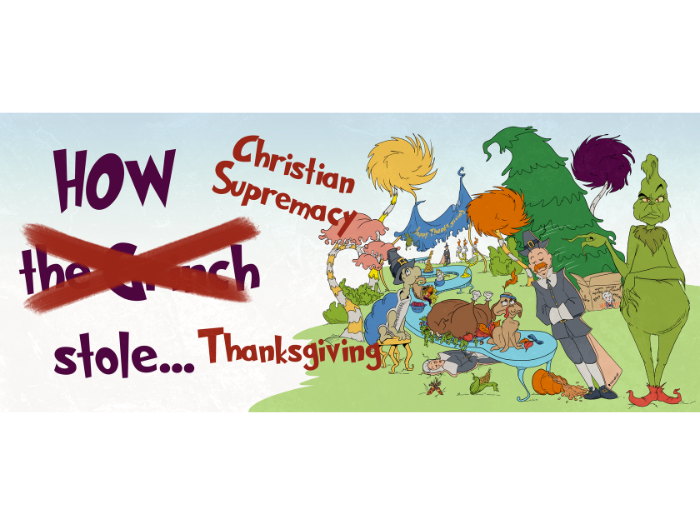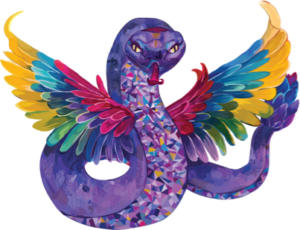
Asking me as an American to make Thanksgiving about family and food is like asking me as a Christian to make Christmas about Santa and presents.
The truth is that it sucks not celebrating Thanksgiving. I loved this holiday. I love the whole day of cooking, the food rituals. I love that almost everyone has the day off or a shorter shift that allowed us all to eat dinner together. It was the single time of year where the whole family gathered at our house, where everyone was welcome. More than Christmas, more than Easter or fourth of July, this was the time where we got to be together and where the matriarch, my great grandmother got to offer wild and generous hospitality to all who crossed our threshold that day.
When I got my own place I continued that tradition and loved more than anything the always interesting and beautiful gathering of friends and family and acquaintances who showed up to our open invitation. It was especially meaningful that there were always queer folks around the table in our fullness, sharing a meal together often because we couldn’t go home or were unwilling to cram ourselves back into closets or boxes that no longer fit. When an LGBTQ community center opened in our town, we hosted the first queer Thanksgiving potluck where were we learned about the real Thanksgiving and have gratitude that we had all made it another year of life. We found home and family in the company of each other even if we were strangers before that day.
Now that I have my own kid, I lament not celebrating the day full of food traditions and centering generosity for our wider community. I would love to make their great-great-grandmother’s recipe for sweet potato casserole and discuss at length how to keep the dressing from getting dry or what in the world a tofurky is.
Lots of people have recommended picking literally any other day of the year to do a harvest and thankfulness meal, but I can’t bring myself to do it. It just isn’t the same as when the whole country pauses to be with friends and family on this one day. There’s a synergy that is missing on other days that feels like being out of step.
Other people insist that in fact, Thanksgiving *is* about family and food. Whatever it’s history, now it’s just about being grateful for what you have and spending time with those you love. I wish that were true for me. That I could just put away the true history of invasion, genocide, and white washing of the horrors of white European colonization of this land, but as an American citizen, I cannot set it aside on this day. It’s like asking me as a Christian to make Christmas about Santa and presents and Christmas tree lights. It’s unthinkable. Christmas is about joy and children and generosity and spending time with our families, but the origin story of it as a Christian holiday is indivisible from our holiday celebrations today. We retell the story, we create holiday traditions that we pass down through the generations. All of this reminds us who we are, what our values are, and where we come from as a people…. Much the same as Thanksgiving in fact.
It’s because of this part -the reminding ourselves who we are as a people- that I choose not to celebrate and not to pass on this holiday to my children. We, as a family, cannot celebrate Thanksgiving and ignore its origins. In this way sometimes it feels like we ruin everything… All the simple joys of our idealized childhood get tarnished with the truth and nothing is quite the same anymore. What’s actually true is that white Christian Supremacy ruins everything, and living a faithful principled life in this particular nation at this particular moment is just difficult sometimes. Solidarity with oppressed peoples still implies moving countercurrent, no matter how many of us claim to be woke.
Our indigenous sisters and brothers ask us not to ignore our past. They ask us to remember the truth, to not perpetuate lies of happy little indians and generous white pilgrims, not to dress up our children in feather headdresses and black Pilgrim hats, to stop the white washing of our nation’s origin story, and to take responsibility for our past in order to move together into a future where we might all live and thrive. They ask us to remember the names of the Wampanoag, Massasoit, Wamsutta Frank James, their stories of the past, and their struggles of the present. They ask us to mourn with them as our ancestors and theirs are inseparably tied together in the painful history of this place we all now call home.
It’s important to name the loss and grief that comes from choosing to live a more conscientious life; this life isn’t always the funnest choice. It often means abandoning thoughts and habits that were once really enjoyable or meaningful. It means recognizing our privilege, even if we also come from oppressed peoples. It sometimes means leaving things behind that were once really special and really important to us. It almost always entails learning truths that you can’t unknow, feeling the pain in others that you can’t unfeel. It often means seeing the ugly reality behind the beautiful idealized facade, even when we were more happy with our fairytale. Sometimes, it means saying goodbye to traditions we love and feeling distanced from those who chose to stay in the fairytale.
It is easy to build up anger and resentment for those who chose the easier, happier fairytale route. Some years I feel jealous of them and the beautiful pictures of food and family I see on social media. My pride gets the best of me, and my integrity becomes a bitter pill to swallow.
Weas people who have had the privilege and innocence not to know the truth of this holiday, not to carry its burden all these years have a responsibility to be honest with each other, and work on it together. I think it’s important that we don’t just pretend that the high road is easy or our feelings resolved. It’s meaningful to share where we struggle, where a principled life gets hard, where it feels lonely, where the right decision feels tough, and the loss we feel from losing a lie that felt so good for so long–even while we acknowledge that others have lost so much more.
It is not my place to judge what others choose to do or not do for Thanksgiving. I can totally understand why folks choose to rename it or reframe it and keep the rest the same. I choose not to for my own reasons, and I let the grief I feel for myself in losing this holiday flow as a stream of empathy into the ocean of pain that our indigenous siblings and ancestors have felt for centuries.
When I’m at my best, I let it renew my hunger for justice and peace and wellbeing for this planet and her creatures. And I give thanks for the life and strength to contribute to this struggle, and for the love that fuels it, generation after generation.
This blog post is part of a series called How white Christian Supremacy Stole…Everything, where we’ll unpack some of the sticky feelings so many of us have around some of the US’s major holidays. The series aims to give a voice to us buzzkills who devote our lives to social justice and have a hard time not feeling like a grinch during every. Single. Holiday. You’re not alone in your grinchiness! Understanding what is harmful about a cultural phenomenon, or what doesn’t sit right with us, can help us identify how we want to reclaim our agency and observe those holidays (or not) in alignment with our ethics and beliefs. In that way, we hope this blog post feels like spiritual accompaniment.


